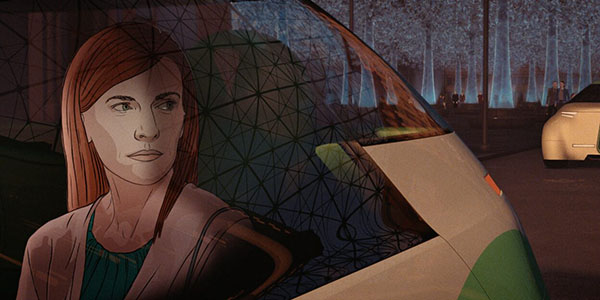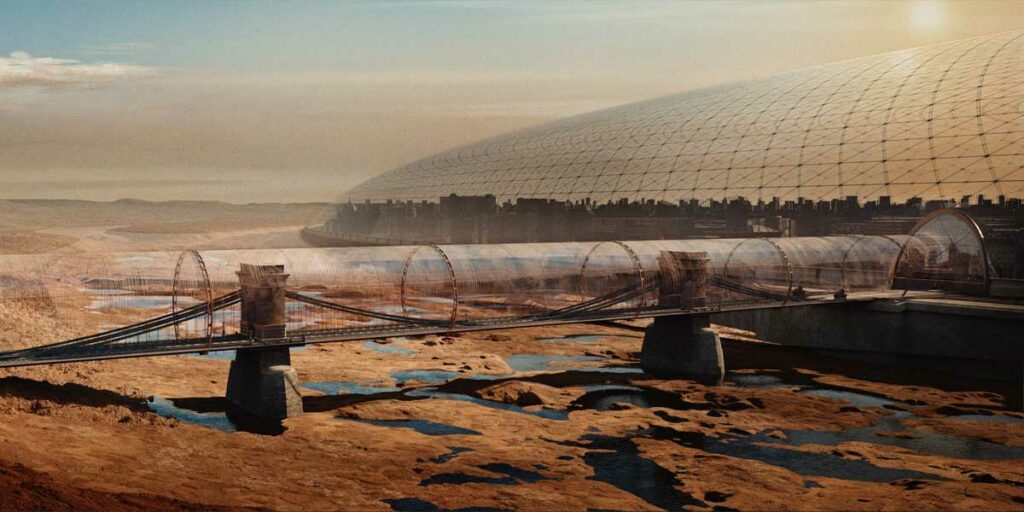The apocalypse has arrived in White Plastic Sky, the Hungarian-set rotoscope animation with impressive world-building and thoughtful environmental commentaries.
After critical and awards success with shorts Les Conquérants (2011) and Leftover (2015), it makes sense for animators Tibor Bánóczki and Sarolta Szabó to turn their wonderful, whacky minds to something feature-length. Step forward White Plastic Sky (Műanyag Égbolt), the duo’s rightfully frightening but surprisingly beautiful vision of a dystopic future, where soil is lifeless, all plants and animals are dead, and humans only live until 50. White Plastic Sky can be silly at times, despite contributions to its screenplay by scientists, but its heart and soul are in the right place – environmentalism clearly sits at the forefront of Bánóczki and Szabó’s minds.
The year is 2123, the setting Budapest. This isn’t the Hungarian capital as we know it; it is a self-contained, condensed version that exists under a plastic dome. It is a change enforced by mother nature, with life outside of this dome impossible. When humans reach 50-years-old, they are given an implant which will ultimately turn them into a tree, thus sustaining the rest of the populace. White Plastic Sky has a terrific intrigue in its earlier moments, as the researched science elements merge with fantastical visions of the future. The rotoscope animation works wonders to create a world that is entrenched in realism and relatability, but still has that futuristic, imaginary feel to it.
The plastic dome itself is a prime example of Bánóczki and Szabó’s terrific world-building, with the superficial setting bearing some similarities to the looming metropolis of Blade Runner (1982). Despite this futuristic tone, Budapest in White Plastic Sky also seems to harken back to Communist societies of the 1950s and onwards, with great, grey buildings and patriotic statues. It’s a riveting combination, but quite swiftly the plastic dome setting is left behind, as protagonists Stefan (Tamás Keresztes, Bet on Revenge) and Nora (Zsófia Szamosi, On the Quiet) set out to save the latter’s life. Struggling to deal with their young son’s death, 32-year-old Nora, still with 18 years left to live, voluntarily has the implant. Outside of the dome, the arid wastelands outside are conjured up in sublime detail by the animation duo; somehow, they infuse bleak vistas with great expression.

White Plastic Sky falters upon Stefan and Nora’s departure, with the humdrum narrative piddling along without creating any deep investment. Similarly, the symbolism conjured up from the enthralling scenery doesn’t translate into the film’s screenplay. The complex notions of environmentalism and human survival never get explored to their fullest potential. Bánóczki and Szabó unevenly flit between these heady, existential themes and the more personal, romantic elements. Stefan and Nora’s relationship is sweet and believable, but the emotional connection to either character is by no means strong.
When White Plastic Sky does click, it sings with an unerring, painfully realistic vision of our possible future. There are intense moments of beauty, with sunlight frequently flooding the screen and giving characters pause for thought, the rays taking on a healing quality for them. White Plastic Sky presents mother nature as an epic force of immense power, but also as something with great compassion and medicinal qualities. The plain narrative and middling central romance hold this unbridled dystopic vision back from anything great, but as a sci-fi experience set in the future but embedded in our present, White Plastic Sky is an eerie and enthralling experience.
White Plastic Sky (Műanyag Égbolt) premiered at the Berlin Film Festival on February 17, 2023, and will be screened again till February 25. Read our Berlin Film Festival reviews!

